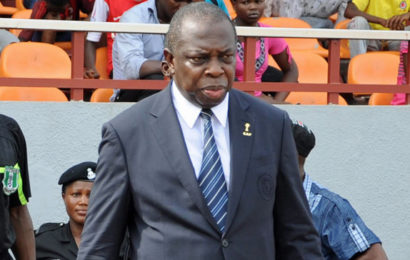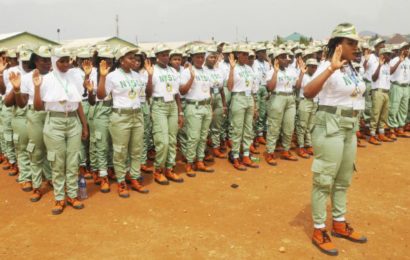 An operative of the Department of State Service, John Utazi, on Tuesday narrated to a Federal High Court in Abuja how his team conducted the search of the Abuja residence of a Justice of the Supreme Court, Justice Sylvester Ngwuta, on October 7, 2016.
An operative of the Department of State Service, John Utazi, on Tuesday narrated to a Federal High Court in Abuja how his team conducted the search of the Abuja residence of a Justice of the Supreme Court, Justice Sylvester Ngwuta, on October 7, 2016.
Utazi, a DSS’ Staff Officer, who was testifying as the fifth prosecution witness in the ongoing trial of the Justice of the apex court, said bags filled with local and foreign currencies as well as documents including building plans, land documents, vehicle papers and statements of bank accounts, were uncovered during the search of judge’s house.
The witness led by the lead prosecuting counsel, Mrs. Olufemi Fatunde, while testifying before the court presided over by Justice John Tsoho on Tuesday.
He said the policemen and private security guards assigned to the Supreme Court Quarters, where Ngwuta’s residence was located, initially did not let him and other operatives into the premises until the guards got the approval of their “superiors”.
Utazi said, “He was standing in the sitting room on the ground floor when we met him.
“I introduced myself and my team members to him and we showed the defendant our identity cards.
“I also gave him the search warrant to read, after which he asked us if the Chief Justice of Nigeria was aware.
“I answered that I was not aware.
“Thereafter, I requested the defendant to search me and members of my team.
“He declined and said there was no trouble.
“However, I asked my team members to search one another in his presence.
“After, we told the defendant that we were ready to conduct the search.”
According to the witness, his team began the operation upstairs of the duplex apartment by searching the sitting room and four bedrooms, including the one designated as the judge’s study, on the floor.
He said his team discovered huge cash sums in some bags kept in the wardrobes in one of the rooms and other cash in foreign currencies in another room.
Utaz said, “He took us upstairs of his residence. There were four rooms and a sitting room upstairs. The four rooms included the defendant’s study.
“He took us to the first bedroom. We started searching while he sat on a seat.
“There were two wardrobes in the room. One was by a closet and the other was facing the closet. As we opened the one facing the closet, there were bags. We opened the bags and asked the defendant to see the content. The content was money.
“The second wardrobe was concealed with a cloth.”
On what was found in the second wardrobe after it was opened, the witness said, “When the wardrobe was opened, we saw a lot of bags and we filled with foreign currencies.”
The witness added, “He took us to another bedroom. We searched it again and we also discovered money.
“After the second bedroom, he took us to his study.
“In the study room, we recovered bank statements, building plans, land documents, documents relating to the defendant’s salary and some vehicle papers.”
He said the fourth room upstairs and other parts of the house were searched but nothing incriminating was found in them.
The witness said further that his team later returned to the ground floor, where the two rooms and two sitting rooms located there, were searched but that nothing “incriminating” was found.
He said his team also searched the kitchen, the boys’ quarters and the car park on the premises but nothing incriminating was discovered..
Utaz added, “We brought down the items recovered to the sitting room downstairs, where we counted the money.
“We documented everything on the back of the search warrant.
“The documentation was done in his presence.
“I endorsed the documented items recovered and also gave it to him to see.
“After seeing it, he read through and signed on it.
“Thereafter, I assembled all items recovered and told the defendant to search us just like we did when we came in.
“The defendant declined to search us but we searched ourselves in the presence of the defendant.
“We then requested the defendant to follow us and he did follow us.”
The search warrant dated October 5, 2016 issued by a Magistrate Court in Abuja was tendered by the prosecuting counsel and was admitted by Justice Tsoho as an exhibit.
The case was fixed for Wednesday to enable the lead defence counsel, Chief Kanu Agabi (SAN), is to cross-examine the witness.
Meanwhile, the prosecution again on Tuesday, amended the corruption charges it preferred against Justice Ngwuta.
Three amendments have now been done to the charges originally filed in December 2016.
Shortly after the lead prosecuting counsel, Mrs. Olufemi Fatunde, announced the latest development to the court on Tuesday, the amended charges were read to the defendant, who pleaded not guilty all the 13 counts.
The amended charges have only one additional count.
The additional count was earlier removed in the previous amended done in March this year.
The re-introduced count has to do with allegation that Justice Ngwuta gave false information to the Nigerian Immigration Service concerning his diplomatic passport with the purpose of procuring another one.
Other charges, including money laundering allegations of retention and concealment of origin of various sums of money in local and foreign currencies allegedly recovered from him during the raid of the operatives of the Department of State Service on October 8, 2016, remained part of the amended charges.
He was also accused, as contained in the previous charges, of giving various cash sums of money above the statutory threshold to his building contractor for the building of various houses in his home state, Ebonyi State, without going through a financial institution.
The lead defence counsel, Agabi, said he had no objection to the amendment and the reading of the charges, but expressed concerns about the frequency of the alterations to the charges.
He noted that it was a confirmation that the prosecution was merely “fishing”.
He also told the judge that the court had the power to reject the amendment if the court was not convinced about it.
He added, “We shall eventually address your lordship on the several amendments.
“It further confirms that the prosecution is fishing.”
Justice Tsoho eventually directed the amended charges to be read to the defendant, who pleaded not guilty to all the counts.
Immediately after Ngwuta took his plea to the amended charges, a DSS operative, Mr. Tanimola Alao, who is the Senior Security and Intelligence Officer of the DSS, also testified on how he obtained Justice Ngwuta’s statement at the DSS office in Abuja on October 9, 2016.
He said Ngwuta signed the statement form containing the cautionary words and after Justice Ngwuta finished with the writing the chief investigator counter-signed the statement.
He added, “I endorsed the statement to the effect that the statement was written voluntarily. The defendant signed and dated it.”
Under cross-examination by the prosecuting counsel, said he did not know what Ngwuta wrote down in the statement as his brief was just to witness the writing of the statement.








